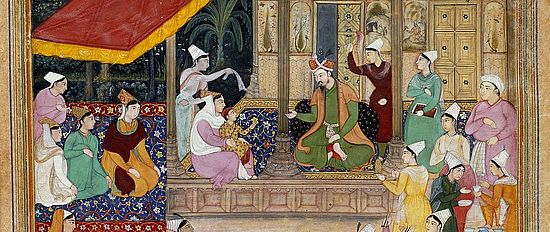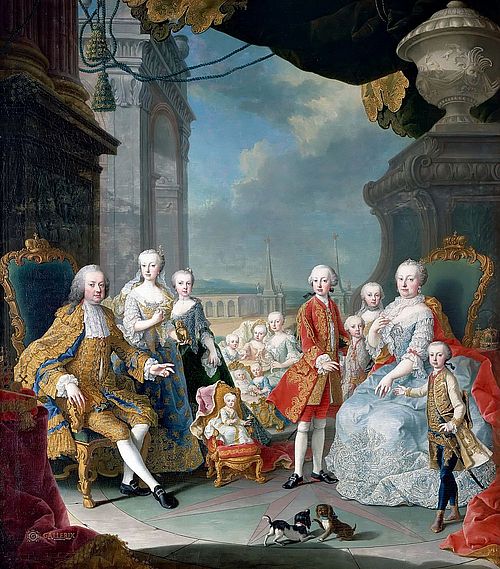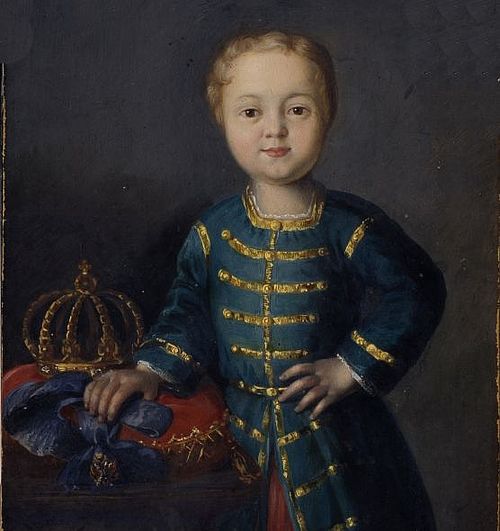Early Childhood and Dynastic Reproduction at Princely Courts, 1600-1800
Our project aims at shedding new light on the ways in which the continuity of dynastic rule was ensured in early modern Europe and beyond. We start from the observation that the providing for healthy, legitimate offspring in order to reiterate the dynastic line constituted a key challenge of early modern European ruling houses, not least due to the importance they gave to the norm of monogamy. By exploiting as different sets of sources such as the records of German princely courts and European travelogues that describe different princely courts in Asia, we aim to understand how contemporaries tackled this challenge on a practical and on an intellectual level.
Dynastic rule was the most widespread form of political organization in the world well into the nineteenth century. However, dynasties had one major weak point: their continuity depended on (usually male) offspring. Recent comparative studies have shown that this problem was especially acute for European dynasties because of the importance they placed on the Christian principle of monogamy. Together with the high infant mortality rates in all strata of early modern societies, this made children a highly precious asset. This project aims to analyze practices and representations connected with the problem of early childhood and dynastic reproduction – i.e., the practices that aimed at providing for numerous and healthy legitimate offspring in order to reiterate the dynastic line – during the seventeenth and eighteenth centuries in Europe and on a global scale. It does so by combining different methodological approaches – archival research, analysis of early modern travel reports, and a comparative analysis – in three distinct subprojects.
The project „Early Childhood and Dynastic Reproduction at Princely Courts, 1600-1800: European and Global Perspectives“ was first based at the Chair of Early Modern History of the University of Fribourg (Switzerland). In August 2023 the project moved to the University of Basel (Switzerland), where Nadine Amsler took over the Chair of Early Modern History.
The project is funded by a PRIMA grant by the Swiss National Science Foundation from 2021 to 2028 (project number 193073).
Subprojects
Team
Enya Robustelli
Enya Robustelli studies history and German philology at the University of Basel. She is particularly interested in social history and the history of bodies, sexuality and animals. She joined the "Dynastic Reproduction" team as a student assisant in February 2025.
Email: e.robustelli@unibas.ch
Former student assistants
Nadia Tamm
Nadia Tamm studies history at the University of Basel and is particularly interested in gender history and the analysis of power structures. She worked for the "Dynastic reproduction" project from August 2023 to January 2025.
Email: nadia.tamm@unibas.ch
Nicolas Galli
Nicolas Galli has studied history at the University of Bern. He has written his master’s thesis on Pope Benedict XIV Lambertini (1675-1758) and his economical practices in the papal states, the archbishopric of Bologna and his family. Nicolas is interested in early modern political, social and diplomatic history. He was part of the project from August 2023 to October 2024 as a scientific collaborator and digital humanities support.
Email: nicolas.galli@unibas.ch
Laurie Rudaz
Laurie Rudaz has studied history at the University of Fribourg. She has written her master’s thesis on Antoinette Bourignon, a female prophet of the seventeenth century. Laurie is interested in modern religious history and gender history. She worked for the „Dynastic Reproduction“ project from September 2022 to July 2023.
Email: laurie.rudaz@unifr.ch
Laurence Koellmann
Laurence Koellmann has studied history at the University of Fribourg. She has written her master’s thesis on French descriptions of Native American allies in the Seven Years‘ War. Laurence is interested in early modern global history and the history of travelogues. She worked for the „Dynastic Reproduction“ project from August 2021 to August 2022.
Email: laurence.koellmann@unifr.ch
Events

On Wednesday, 21st of May, Pascal Firges (Basel) will hold a lecture with the title "Wer? Was? Wann? ‚Aussereuropäische‘ Argumente im europäischen Geschlechterdiskurs der Frühen Neuzeit" as part of the research colloquium ‘Current Research on the History of Pre-Modernity’ at the Department of History of the University of Basel.
When: Wednesday, 21st of May, 6:15-8:00 pm
Where: Departement of History, Hirschgässlein 21, 4056 Basel, Seminarraum 1
Here you can find the program of the research colloquium.

May 14th 2025, Alumni Geschichte spring event with Prof. Dr. Nadine Amsler
‘At a distance? Emotions in the princely nursery of the early modern period’
Lecture by Prof. Dr. Nadine Amsler
There seems to have been little room for emotional closeness at the princely court in the early modern period. Educational writings advised princes and princesses to maintain distance from their social environment in order to avoid favouritism. This habitus of rulers was to be practised from an early age; governesses and doctors, wet nurses and nannies were required to treat the princely children with the necessary respect at all times. Against this background, what role did feelings and emotionality play in the everyday lives of young princely children?
The lecture explores this question using the example of the Munich electoral court and explores the possibilities of an emotional history of the princely nursery in the early modern period.
Wednesday, May 14th 2025, 6.30 pm
Basel University Library, lecture theatre 1st floor, 4056 Basel
After the event there will be an aperitif and time for personal encounters.
Registration is not necessary.
Here you can find the program of the lecture.

Where and When: 12th to 14th of June 2024, Kloster Dornach, Amthausstrasse 7, 4143 Dornach, Switzerland
Organized by Nadine Amsler (Basel), Cristian Consuegra (Basel) and Pascal Firges (Bielefeld/Duisburg-Essen)
Abstract: To what extent did European contemporaries in the early modern period perceive not only Europe as a society of princes, but also the entire globe as a world of kings and queens? Based on this question, this workshop is dedicated to European descriptions of dynastic orders of distant lands by travelers and receiving authors in the early modern period. It is particularly interested in the interactions between local knowledge and the translocal discourses in which travelogues, country descriptions and correspondence were integrated. We are not only interested in the modes and purposes of acquiring knowledge about local forms of rule, but also in the addressees of descriptions of the systems of rule of distant countries. We also raise the question of whether and under what circumstances observing the ruling systems of distant countries was also able to trigger a reflection on one’s own understanding of dynastic rule.
Here you can find the program of the workshop.
Here you can find the conference report.
As part of the convention Deutscher Historikertag at the University of Leipzig, Nadine Amsler will give a lecture on September 21st 2023 entitled: A Call for Help from China? Rome and the Letter of the Last Empress of the Ming Dynasty.
You can find the programme for the event under the following link: https://www.historikertag.de/Leipzig2023/programm/sektionen/geruechte-geheimnisse-falschnachrichten-zur-evaluation-politischer-informationen-im-17-und-18-jahrhundert/
A short interview with Nadine Amsler on her research and on the panel
Nadine Amsler at the Swiss Congress of Historical Sciences
The 6th edition of the Schweizerische Geschichtstage were dedicated to the overaching topic “Nature” and held in Geneva from 29 June to 1 July 2022. We participated with the panel “Nature versus nurture? Children’s ‘nature’ in pedagogical discourse and practice”.
Image credits
Madame de Ventadour with Louis XIV and his Heirs (between 1715 and 1720), The Wallace Collection, London (UK). © The Wallace Collection.
Spring Morning in the Han Palace, (date unknown), by Qiu Ying (仇英, ca. 1494–1552), Handscroll, ink and color on silk, National Palace Museum, Taipei (Taiwan).
Celebrations at the time of Akbar's circumcision, in: Akbarnama (around 1602-1603), from the archive of the British Library, London (UK).
Franz I. Stephan und Maria Theresia im Kreise der Familie (between 1754 and 1755), Schloss Schönbrunn, Vienna (Austria). Wikipedia Commons.
Chand Bibi hawking (around 1580) from the archive of the British Library, London (UK), Add.Or.3849
Portrait of the Emperor of Russia Ivan VI Antonovich (date unknown), State Open air Museum Oranienbaum, St. Petersburg (Russia). Wikimedia Commons.
Emperor Qianlong’s Pleasure during Snowy Weather (between circa 1736 and circa 1738). The Palace Museum, Beijing (China). Wikimedia Commons.










